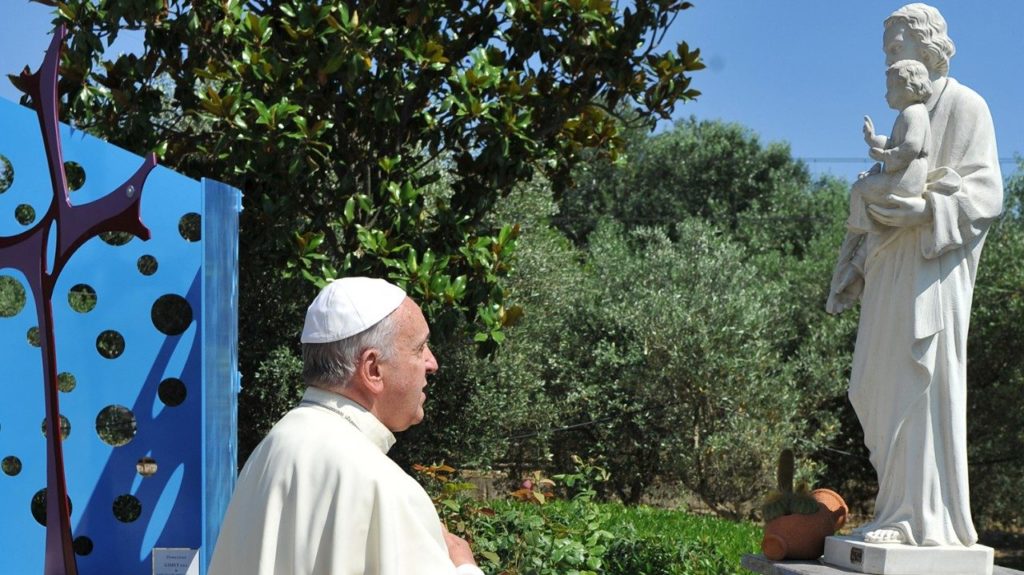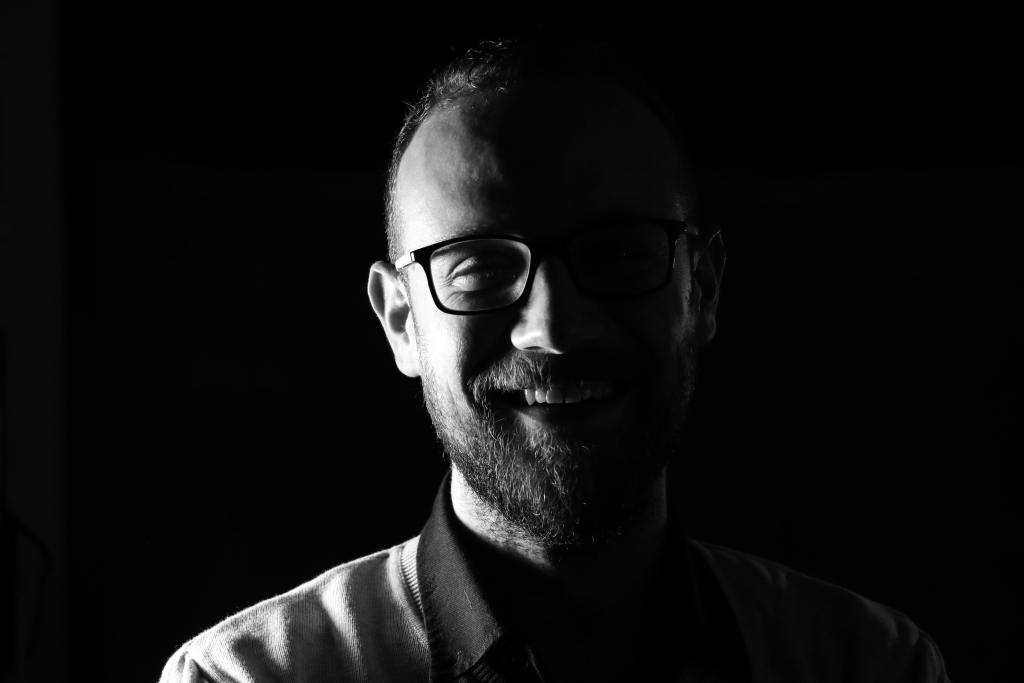Saint Joseph, According to Pope Francis
Analysis of the Holy Father’s Letter ‘Patris Corde’

Father Jairo Yate, Judge Instructor in the diocese of Ibague, Colombia, analyses Pope Francis’ Letter Patris Corde, to commemorate the 150th anniversary of the Decree Quemadmodum Deus, with which Blessed Pius IX declared Saint Joseph Patron of the universal Church, and he offers “seven themes in Saint Joseph’s life according to Pope Francis.”
* * *
“A Saint Joseph with a father’s heart,” Patris Corde. Is the title the Holy Father Francis chose for his Apostolic Letter for the celebration of the Year of Saint Joseph. We imagine a Saint Joseph with a father’s heart. In fact, the model of a father and husband as our Catholic Church has preached in the course of the centuries.
Saint Joseph also enjoys some defined qualities, which Pope Francis presents in his Letter. For instance, the Pope says: we know he was a humble carpenter (cf. Matthew 13:55), married to Mary (cf. Matthew 1:18; Luke 1:27); a “just man” (Mathew 1:19), ever ready to do God’s Will manifested in His Law (cf. Luke 2:22.27.39) and through the four dreams he had (cf. Matthew 1:20; 2:13.19.22). After a long and hard journey from Nazareth to Bethlehem, he saw the Messiah born in a stable because “there was no place for them in the Inn” (Luke 2:7). He witnessed the adoration of the shepherds (cf. Luke 2:8-20) and of the Magi (cf. Matthew 2:1-12), who represented the people of Israel and the pagan peoples respectively. He had the courage to assume the legal paternity of Jesus, whom he gave the name revealed to him by the Angel: “You shall call His name Jesus, for He will save His people from their sins” (Matthew 1:21).
What does Pope Francis Say in his Apostolic Letter?
The Pope dedicates his Letter to all those that are in the second-line. He affirms it, saying: Everyone can find in Saint Joseph — the man who goes by unnoticed, the man of daily, discreet and hidden presence — an intercessor, a support, a guide in difficult times. Saint Joseph reminds us that all those that are seemingly hidden or in the second line have an unrivaled role in the history of salvation. Addressed to all of them is a word of recognition and gratitude.
The Pope Proposes Seven Themes in the Life of Saint Joseph
- Saint Joseph as “beloved Father.” Saint Joseph’s greatness consists in the fact that he was Mary’s husband and Jesus’ father. As such, “he entered in the service of the whole economy of the Incarnation, as Saint John Chrysostom says. Saint Paul VI observed that his paternity was manifested concretely “by having made of his life service, a sacrifice to the mystery of the Incarnation and to the redeeming mission that is united to it; by having used the legal authority that corresponded to him in the Holy Family, to make of it a total gift of himself, of his life <and> of his work.
- “The Father of tenderness.” Joseph saw Jesus progress day after day “in wisdom, in stature and in grace before God and men” (Luke 2:52). As the Lord did with Israel, so he “taught Him to walk, took Him up in his arms: he was for Him as a father that lifts a child to his cheeks and bends down to feed Him” (cf. Hosea 11:3-4). Jesus saw God’s tenderness in Joseph: “As a father pities his children, so the Lord pities those who fear Him” (Psalm 103:13). In the synagogue, during the prayer of the Psalms, Joseph would certainly have heard the echo that the God of Israel is a God of tenderness (cf. Deuteronomy 4:31; Jeremiah 31:20), who is good to all and whose “tenderness reaches all creatures” (Psalm 145:9).
- “Father in obedience.” As God did with Mary, when He manifested to Her His plan of salvation, He also revealed His designs to Joseph and He did so through his dreams that, in the Bible, as in all ancient peoples, were considered one of the means through which God manifested His Will (cf. Genesis 20:3; Numbers 12:6; Job 33:15). Joseph was very anguished by Mary’s incomprehensible pregnancy; he did not want to “denounce Her publicly” (cf. Deuteronomy 22:20-21), but he decided “to send Her away quietly” (Matthew 1:19). In the first dream, the Angel helped him to resolve his grave dilemma: “Do not fear to take Mary your wife, for that which is conceived in Her is of the Holy Spirit; She will bear a son, and you shall call His name Jesus, for He will save His people from their sins” (Matthew 1:20-21). His answer was immediate: “When Joseph woke from sleep, he did as the Angel of the Lord commanded him” (Matthew 1:24). He overcame his drama with obedience and saved Mary.
- “Father in fostering.” Joseph took Mary without placing previous conditions, he trusted in the Angel’s words. “The nobility of his heart makes him subordinate to charity what he learned by law; and today, in this world where psychological, verbal and physical violence against women is patent, Joseph appears as a figure of a respectful, delicate man that, although not yet having all the information, decides for Mary’s reputation, dignity, and life. And in his doubt about what best to do, God helped him to opt by illuminating his judgment.” Joseph’s spiritual life doesn’t show us a way that explains, but a way that accepts. Only from this acceptance, from this reconciliation, we can also intuit a greater story, a more profound meaning.
- “Father of creative courage.” God acts through events and people. Joseph was the man through whom God took care of the beginnings of the history of salvation. He was the true “miracle” with whom God saved the Child and His Mother. Heaven intervened, trusting in the creative courage of this man, who when he arrived in Bethlehem did not find a place where Mary could give birth, so he went to a stable, and arranged it, making it the most welcoming place possible for the Son of God, who was coming into the world (cf. Luke 2:6-7). Given the imminent danger of Herod, who wanted to kill the Child, Joseph was alerted once again in a dream, to protect Him and, in the middle of the night, he organized the flight into Egypt (cf. Matthew 2:13-14).
- “Working Father.” Saint Joseph was a carpenter who worked honestly to ensure his family’s sustenance. Jesus learned from him the value, the dignity, and the joy of what it means to eat the bread that is the fruit of one’s work. Work became participation in the work itself of salvation, an opportunity to accelerate the advent of the Kingdom to develop one’s potentialities and qualities, putting them at the service of society and of communion. Saint John Paul II affirmed that: with his workman will procure his daily bread, contribute to the continuous progress of the sciences and technology and, especially, the incessant cultural and moral elevation of the society in which he lives, in community with his brothers. And “work” means all types of actions carried out by man regardless of his characteristics or circumstances; it means all human activity that can be or must be recognized as work among the many activities of which man is capable and to which he is predisposed by nature itself in virtue of his humanity. Made in the image and likeness of God in the visible world and placed in it to master the earth, man is therefore called, from the beginning, to work. Work is one of the characteristics that distinguish man from the rest of creatures (Encyclical Letter Laborem Exercens, 1).
- “Father in the shadow.” He defines the figure of Saint Joseph with the evocative image of the shadow, which for Jesus is the shadow of the Heavenly Father on earth: he helps him, protects him, never leaves his side to follow his steps. Let us think of what Moses reminds Israel: “In the wilderness, where you have seen how the Lord your God bore you, as a man bears his son, in all the way” (Deuteronomy 1:31). Thus Joseph exercised paternity during his whole life. Joseph’s happiness is not in the logic of self-sacrifice but in the gift of himself. Frustration is never perceived in this man, but only trust. His persistent silence has no room for complaints, but concrete gestures of trust.
Translation by Virginia M. Forrester
Related

The Liturgical Year in the Catholic Church: An Annual Journey Through the Mysteries of Christ
Exaudi Staff
15 January, 2026
6 min

Perseverance in Vocation
Miguel Morales Gabriel
15 January, 2026
6 min

The Three Revolutions: Glorious, French, and Industrial
RHUM, revista de humanidades
14 January, 2026
13 min

Virtue at the Heart of Business: A Vision for Human and Economic Flourishing
Javier Ferrer García
14 January, 2026
4 min
 (EN)
(EN)
 (ES)
(ES)
 (IT)
(IT)

